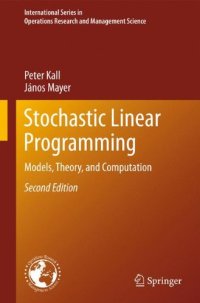
Ebook: Stochastic linear programming: Models, theory, and computation
Author: Peter Kall János Mayer (auth.)
- Genre: Computers // Programming
- Tags: Optimization, Operations Research Mathematical Programming, Appl.Mathematics/Computational Methods of Engineering, Probability Theory and Stochastic Processes, Operations Research/Decision Theory, Applications of Mathematics
- Series: International Series in Operations Research & Management Science 156
- Year: 2011
- Publisher: Springer US
- Edition: 2
- Language: English
- pdf
This new edition of Stochastic Linear Programming: Models, Theory and Computation has been brought completely up to date, either dealing with or at least referring to new material on models and methods, including DEA with stochastic outputs modeled via constraints on special risk functions (generalizing chance constraints, ICC’s and CVaR constraints), material on Sharpe-ratio, and Asset Liability Management models involving CVaR in a multi-stage setup. To facilitate use as a text, exercises are included throughout the book, and web access is provided to a student version of the authors’ SLP-IOR software. Additionally, the authors have updated the Guide to Available Software, and they have included newer algorithms and modeling systems for SLP. The book is thus suitable as a text for advanced courses in stochastic optimization, and as a reference to the field. From Reviews of the First Edition: "The book presents a comprehensive study of stochastic linear optimization problems and their applications. … The presentation includes geometric interpretation, linear programming duality, and the simplex method in its primal and dual forms. … The authors have made an effort to collect … the most useful recent ideas and algorithms in this area. … A guide to the existing software is included as well." (Darinka Dentcheva, Mathematical Reviews, Issue 2006 c) "This is a graduate text in optimisation whose main emphasis is in stochastic programming. The book is clearly written. … This is a good book for providing mathematicians, economists and engineers with an almost complete start up information for working in the field. I heartily welcome its publication. … It is evident that this book will constitute an obligatory reference source for the specialists of the field." (Carlos Narciso Bouza Herrera, Zentralblatt MATH, Vol. 1104 (6), 2007)
This new edition of Stochastic Linear Programming: Models, Theory and Computation has been brought completely up to date, either dealing with or at least referring to new material on models and methods, including DEA with stochastic outputs modeled via constraints on special risk functions (generalizing chance constraints, ICC’s and CVaR constraints), material on Sharpe-ratio, and Asset Liability Management models involving CVaR in a multi-stage setup. To facilitate use as a text, exercises are included throughout the book, and web access is provided to a student version of the authors’ SLP-IOR software. Additionally, the authors have updated the Guide to Available Software, and they have included newer algorithms and modeling systems for SLP. The book is thus suitable as a text for advanced courses in stochastic optimization, and as a reference to the field. From Reviews of the First Edition: "The book presents a comprehensive study of stochastic linear optimization problems and their applications. … The presentation includes geometric interpretation, linear programming duality, and the simplex method in its primal and dual forms. … The authors have made an effort to collect … the most useful recent ideas and algorithms in this area. … A guide to the existing software is included as well." (Darinka Dentcheva, Mathematical Reviews, Issue 2006 c) "This is a graduate text in optimisation whose main emphasis is in stochastic programming. The book is clearly written. … This is a good book for providing mathematicians, economists and engineers with an almost complete start up information for working in the field. I heartily welcome its publication. … It is evident that this book will constitute an obligatory reference source for the specialists of the field." (Carlos Narciso Bouza Herrera, Zentralblatt MATH, Vol. 1104 (6), 2007)